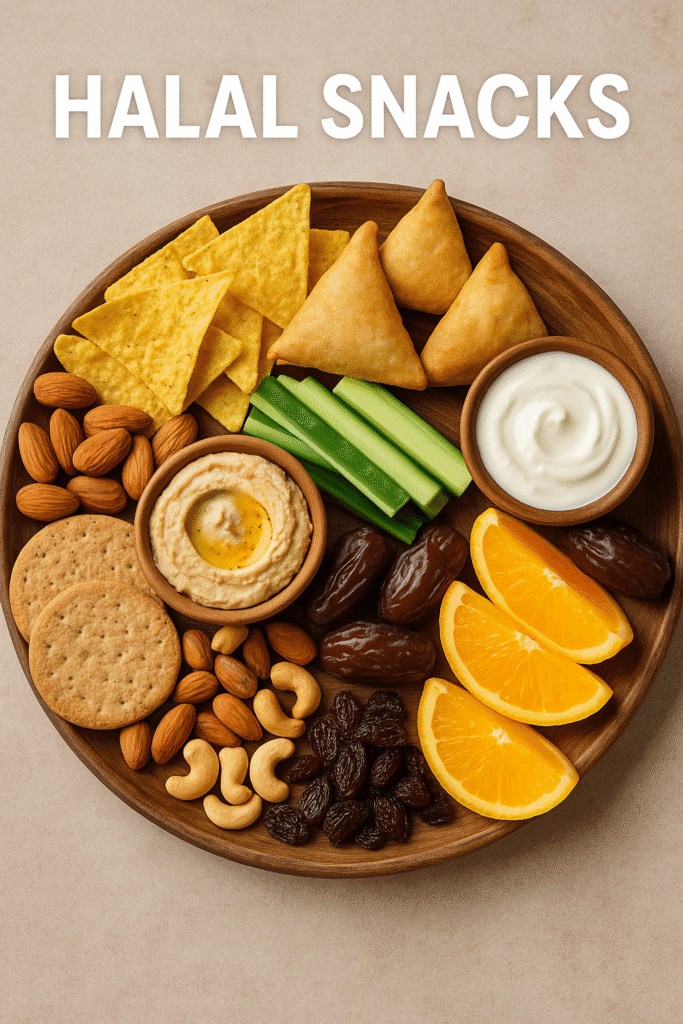What Snacks Can Muslims Eat? A Complete Guide to Halal Snacking
For Muslims, choosing the right snacks isn’t just about taste—it’s about ensuring the food is halal (permissible) according to Islamic dietary laws. Whether it’s a quick bite between meals or something to enjoy during gatherings, knowing what snacks Muslims can eat helps in making mindful and faith-conscious choices.
Understanding Halal and Haram Snacks
Before diving into snack ideas, it’s important to know what makes a snack halal. In Islam, food is classified into two categories:
- Halal – permissible
- Haram – prohibited
Snacks are considered halal if they:
- Contain no pork or pork by-products
- Are free from alcohol or intoxicants
- Use halal-certified meat (if any)
- Have permissible ingredients and processing methods

Popular Halal Snack Options
Here’s a look at tasty, widely available snacks Muslims can enjoy:
1. Fresh Fruits and Vegetables
Simple, nutritious, and naturally halal. Favorites include:
- Apple slices with peanut butter
- Cucumber sticks with hummus
- Dates and dried figs
2. Nuts and Seeds
High in protein and healthy fats, they make a great on-the-go option:
- Almonds, cashews, and walnuts
- Pumpkin or sunflower seeds
- Trail mix (check for halal-certified chocolate)
3. Halal-Certified Packaged Snacks
Many popular brands now carry halal certification:
- Halal gummy candies
- Chips cooked in vegetable oil
- Halal beef jerky
4. Dairy-Based Snacks
If dairy is from halal-certified sources:
- Cheese sticks
- Yogurt with fruit toppings
- Smoothies made with fresh fruits and milk
5. Traditional Muslim Snacks
Depending on the region, these might include:
- Samosas – fried or baked pastry with vegetable or halal meat filling
- Pakoras – spiced fritters made from vegetables or lentils
- Maamoul – date-filled cookies popular in Middle Eastern cultures
Snacks to Avoid
Muslims should steer clear of:
- Snacks with gelatin from non-halal sources
- Foods with alcohol-based flavorings
- Meat-based snacks without halal certification
Tips for Finding Halal Snacks
- Check Labels Carefully – Look for “halal” certification or review the ingredient list.
- Know Common Hidden Ingredients – Such as lard, animal-based gelatin, or alcohol-based extracts.
- Buy from Trusted Stores – Halal butchers, Islamic grocery stores, and reputable supermarkets.
Frequently Asked Questions
Can Muslims eat vegetarian snacks?
Yes, as long as they don’t contain alcohol or other prohibited ingredients.
Are all chips halal?
Not always. Some use animal-based seasonings or non-halal cheese powder.
Is chocolate halal?
Plain chocolate without alcohol-based flavoring or animal fats is usually halal.
What about energy bars?
They’re fine if free from prohibited ingredients like non-halal gelatin.
Final Thoughts
Knowing what snacks Muslims can eat comes down to being aware of ingredients, certification, and preparation. Whether enjoying fresh fruit, traditional bites like samosas, or packaged treats with a halal logo, Muslims can snack deliciously while staying true to their faith. Ramzan prayer time
For more information on halal food guidelines, visit the Islamic Council of America’s Halal Certification Guide.
